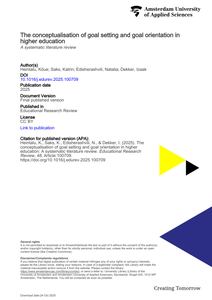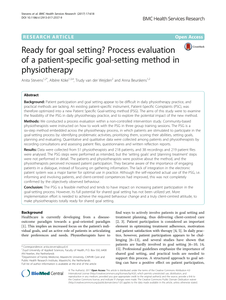This study explores the psychometric properties of three instruments: a semi-structured interview, a questionnaire and a sorting task. The central question is which instrument is most suitable to investigate the goal orientations of students in competence-based Pre-Vocational Secondary Education. The questionnaire proved most accurate. The interview provided relevant supplementary information on the goals of the students and underlying motives. The sorting task appeared to be less suitable.
DOCUMENT
-
DOCUMENT
The purpose of this study was to investigate relations between goal orientations, information processing strategies and development of conceptual knowledge of pre-vocational secondary education students (n=719; 14 schools). Students' preferences for certain types of goals and information processing strategies were examined using questionnaires. Conceptual knowledge was investigated by having students create concept maps before and after a learning project. Structural analyses showed that student preferences for mastery and performance goals positively affected their preferences for the use of deep and surface information processing strategies. Preferences for work avoidance goals negatively influenced preferences for deep and surface processing. Use of surface information processing strategies negatively affected the development of conceptual knowledge. Remarkably, no relation was found between students' preferences for deep processing strategies and development of conceptual knowledge.
LINK
Student goals play a crucial role in both practice and theory in higher education, particularly for understanding and enhancing student motivation. However, on a conceptual level, goals are studied through separate and isolated frameworks, which complicates the ability of practitioners and researchers to combine insights from both streams of scholarship effectively. This systematic review aimed to comprehensively examine and describe the frameworks (198 studies), and conceptual distinctions and characteristics (48 studies) used in research on goal setting and goal orientation in the context of higher education since 2018. The studies selected for analysis had to discuss students’ learning process, address goal setting and goal orientation, and be published in academic journals in English. Goal-setting theory was the most frequently used for the goal-setting concept, while achievement goal theory (2 × 2 model) dominated for goal orientation. Summative content analysis revealed that goal-setting frameworks primarily emphasised the concept of the goal itself, including its structure, goal commitment, implementation intentions, and the processes leading to goal achievement. In contrast, goal orientation frameworks delved deeper into the underlying motivations driving goal pursuit, exploring related attitudes, addressing specific educational objectives and strategies, emotional factors, and the detailed standards individuals set for their outcomes. Because these theories are complementary, we propose an integrated goal setting and orientation (IGSO) theory, which can help in studying and understanding how motivation for goal pursuit is connected with the setting, monitoring and evaluation of goals.
MULTIFILE

Background: Patient participation and goal setting appear to be difficult in daily physiotherapy practice, and practical methods are lacking. An existing patient-specific instrument, Patient-Specific Complaints (PSC), was therefore optimized into a new Patient Specific Goal-setting method (PSG). The aims of this study were to examine the feasibility of the PSG in daily physiotherapy practice, and to explore the potential impact of the new method. Methods: We conducted a process evaluation within a non-controlled intervention study. Community-based physiotherapists were instructed on how to work with the PSG in three group training sessions. The PSG is a six-step method embedded across the physiotherapy process, in which patients are stimulated to participate in the goal-setting process by: identifying problematic activities, prioritizing them, scoring their abilities, setting goals, planning and evaluating. Quantitative and qualitative data were collected among patients and physiotherapists by recording consultations and assessing patient files, questionnaires and written reflection reports. Results: Data were collected from 51 physiotherapists and 218 patients, and 38 recordings and 219 patient files were analysed. The PSG steps were performed as intended, but the ‘setting goals’ and ‘planning treatment’ steps were not performed in detail. The patients and physiotherapists were positive about the method, and the physiotherapists perceived increased patient participation. They became aware of the importance of engaging patients in a dialogue, instead of focusing on gathering information. The lack of integration in the electronic patient system was a major barrier for optimal use in practice. Although the self-reported actual use of the PSG, i.e. informing and involving patients, and client-centred competences had improved, this was not completely confirmed by the objectively observed behaviour. Conclusion: The PSG is a feasible method and tends to have impact on increasing patient participation in the goal-setting process. However, its full potential for shared goal setting has not been utilized yet. More implementation effort is needed to achieve the required behaviour change and a truly client-centred attitude, to make physiotherapists totally ready for shared goal setting.
DOCUMENT

Abstract Study Objective To provide an overview of patients' needs concerning goal‐setting, and indications of how those needs can be met by nurses. Methods A narrative review. Pubmed and Cinahl were searched through March 1, 2020 for: patients' experiences concerning goal‐setting and the role of nursing in rehabilitation. Additional articles were found through snowballing. A total of 22 articles were reviewed on patients' experiences, and 12 on the nursing role. Results Patients need to be prepared for collaborating in goal‐setting and to receive an explanation about their part in that process. The multiplicity of disciplines may cloud patients' understanding of the process. The nurse's planning of the rehabilitation process should be aimed at resolving this issue. Goals need to be meaningful, and patients need support in attaining them. The interpretive, integrative, and consoling functions of Kirkevold's nursing role are suitable to meet these needs. Conclusions Both the literature about patients' needs regarding goal‐setting and the nursing role make clear that the way nurses work in rehabilitation can gain in clarity. Strengthening the role of nurses will improve the goal‐setting process for patients. Interprofessional collaboration, clear work procedures, continuity of care, time and trust, and the physical environment all are important to reinforce this role.
MULTIFILE

The purpose of this study was to validate a causal and hierarchical model that describes the relations between goal orientations, information processing strategies and development of conceptual knowledge of pre-vocational secondary education-students (n=719; 14 schools). Preferences of students for certain types of goals and information processing strategies were examined using questionnaires. The development of conceptual knowledge was investigated by having students create concept maps before and after a learning situation (e.g. a project). Results of causal and hierarchical analyses showed that students' preferences for mastery and performance goals positively affected their preferences for using deep information processing strategies. Performance of surface information processing strategies had a negative effect on the development of conceptual knowledge.
DOCUMENT
This study focuses on students’ approaches to learning, particularly in innovative learning environments. A person-oriented research perspective was chosen to search for nuances and details that add to existing knowledge on secondary students’ learning. The relation between students’ goal orientations, learning strategies, and different learning environments was investigated via questionnaires and interviews. The questionnaire study revealed four profiles of 673 students’ (meta-)cognitive learning strategies. Differences in student learning were found between students of an innovative school and students of regular schools, indicating that learning strategies are elicited by the learning environments students are confronted with. The interview study with 20 students from the innovative school illustrated their learning in learning environments typical for this school. Results revealed how students from different profiles differed in their goal orientations and learning strategies and that these differences were related to students’ need for teacher support when learning. The results of this study provide qualitative and quantitative insight in (enhancing) secondary students’ learning, doing justice to the learners as persons and individual differences.
LINK
The purpose of this study was to investigate relations between goal orientations, information processing strategies and development of conceptual knowledge of pre-vocational secondary education students (n=719; 14 schools). Student preferences for certain types of goals and information processing strategies were examined using questionnaires. Conceptual knowledge was investigated by having students create concept maps before and after a learning project. Structural and hierarchical analyses show that student preferences for mastery and performance goals positively affected their preferences for the use of deep information processing strategies. Use of surface information processing strategies negatively affected the development of conceptual knowledge.
DOCUMENT
Background: Goal setting is an essential step in the clinical reasoning process of speech and language therapists (SLTs) who provide care for children, adolescents and adults with communication disorders. In the light of person-centred care, shared or collaborative goal setting between the SLT and client is advised in (inter)national guidelines. SLTs face challenges in implementing (shared) goal setting as theoretical frameworks and practical interventions are scarce and less applicable to use with a wide range of communication vulnerable populations. Aims: A first step in developing theory and practical interventions is to explore first-hand experiences of SLTs and clients about day-to-day goal-setting practice. This study was guided by the following research question:What are the perspectives and needs of SLTs and persons with communication disorders regarding (shared) goal setting in routine SLT services? Methods & Procedures: The qualitative study was carried out in the setting of routine speech–language therapy services in community practices, primary education and neurological rehabilitation in the Netherlands. Data collection followed the principles of video-reflexive ethnography, using video footage of goal-setting conversations to facilitate semi-structured, reflexive interviews.Data analysis was based on reflexive thematic analysis. A total of 12 interviews were conducted with client–SLT dyads, covering perspectives from children, parents and adults with a range of communication difficulties and their SLTs. Outcomes & Results: Data analysis resulted in four themes, of which two contain subthemes. Each theme represents a central organizing concept found in SLT and client interviews. The themes were identified as: (1) goal setting is a complex process; (2) goal talk needs to be communication accessible; (3) communicative participation goals are hard to grasp; and (4) the importance of relationships. Topics such as power imbalance, communication vulnerability, effective communication strategies, and motivation and trust are explored under these themes. Conclusions & Implications: SLTs are encouraged to view shared goal setting as a process that needs to be explicitly planned and communicated with clients regardless of their age or communication vulnerability. SLTs have expert knowledge and skills when it comes to supporting communication and applying these skills during goal talks might strengthen shared goal setting and foster a therapeutic relationship. There is a need to concretely conceptualize and embed shared goal setting in policy and clinical guidelines. The themes reported have tentative clinical implications for developing such policy, and shared goal-setting interventions for SLT practice, under the condition that SLTs and people with communication disorders are continuously involved.
MULTIFILE
